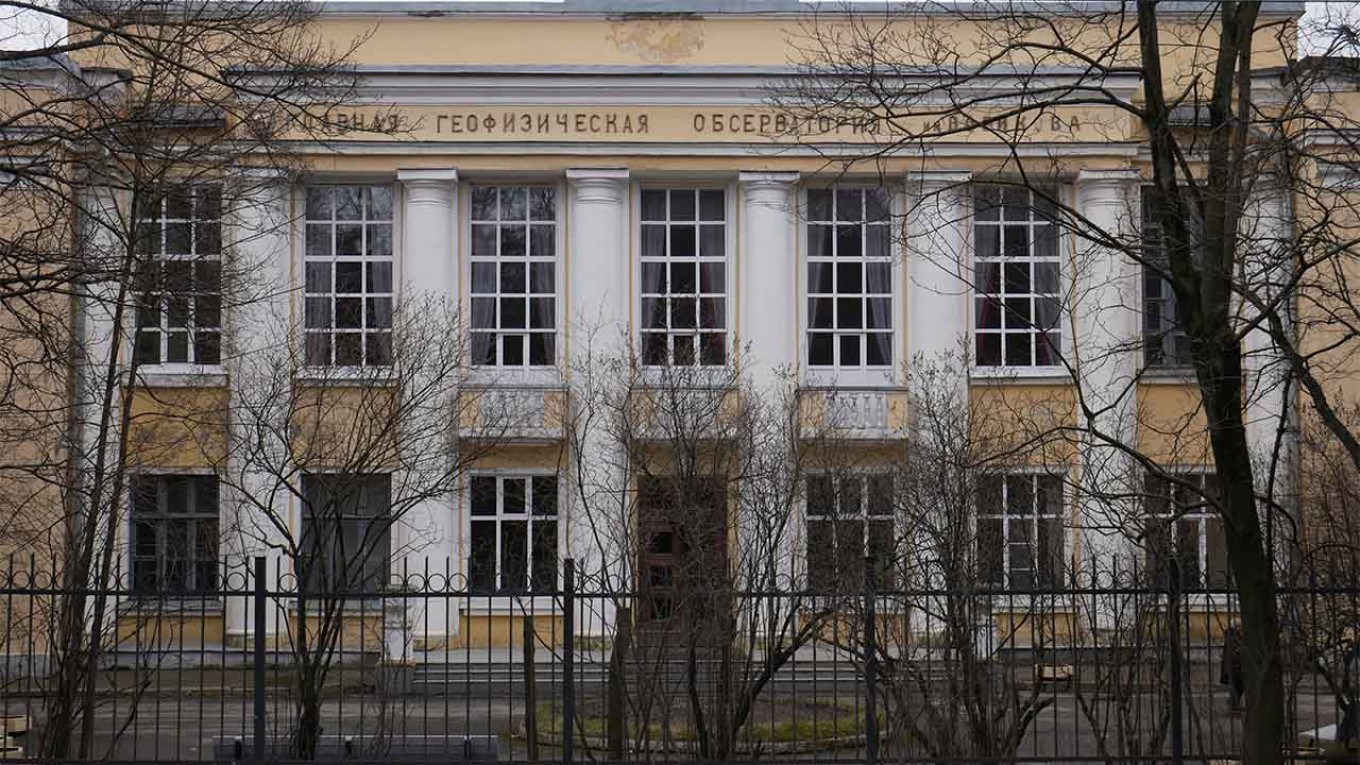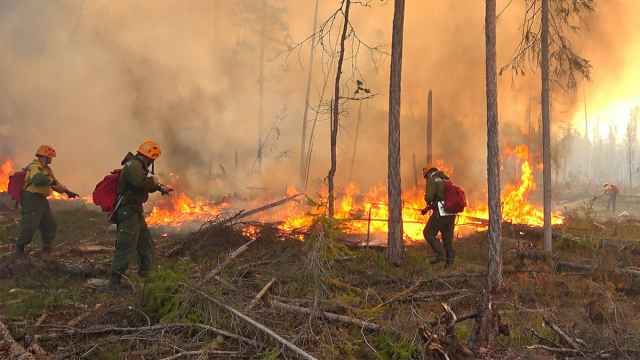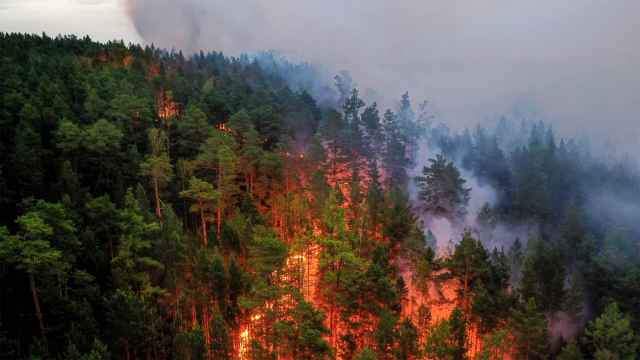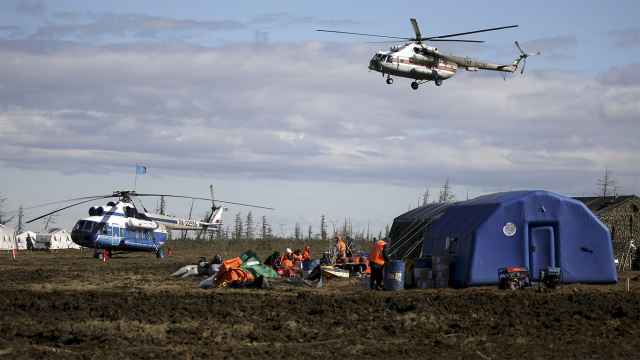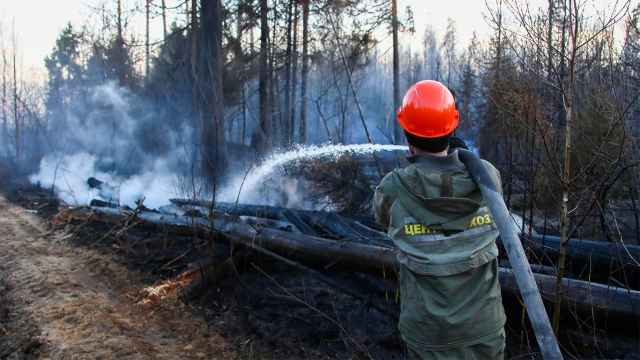Russia’s top climate scientist Dr. Vladimir Kattsov is confident that serious environmental changes lie in store this century.
“Russia is among the countries where the average warming greatly exceeds the global average, and Russia is warming especially quickly the closer you get to the Arctic,” Kattsov, 58, told The Moscow Times in an interview in the Voeikov Main Geophysical Observatory in St. Petersburg, the country’s oldest meteorological institution. “Among the most obvious and dangerous consequences will be an increase in high-impact weather events.”
The government has tasked the Voeikov Observatory, which Kattsov heads, with forecasting the effects of climate change across Russia. Kattsov is also a regular contributor to government policy papers on climate change and the UN’s Intergovernmental Panel on Climate Change (IPCC).
The observatory develops physico-mathematical models of expected climate change in Russia, using supercomputers and meteorological data gathered through a network of stations across the country.
Kattsov said the data shows there has already been a noticeable increase in extreme weather events in Russia since he first joined the field in the 1980s.
“Our initial understandings of how climate change would play out have received more and more confirmation over the years,” Kattsov said.
“We now have sufficient basis to say that the projections we made all those years ago are being confirmed.”
How has Russia’s climate already changed?
Apart from Russia warming at 2.5 times the global average since the 1970s, Kattsov said a more dangerous phenomenon has been the increase in temperature variability — meaning more frequent spikes and troughs in hotter or colder directions.
This trend is more damaging than gradual warming because it is harder to predict and prepare for, and it also contributes to catastrophes like floods and droughts.
According to a 2017 report about climate risks in Russia edited by Kattsov for the Climate Center of Roshydromet — Russia’s federal service for hydrometeorology and environmental monitoring of which the Voeikov Observatory is a part — there has been a marked increase in the number of temperature anomalies in Russia since the 1970s amid the pronounced increase in the surface air temperature.
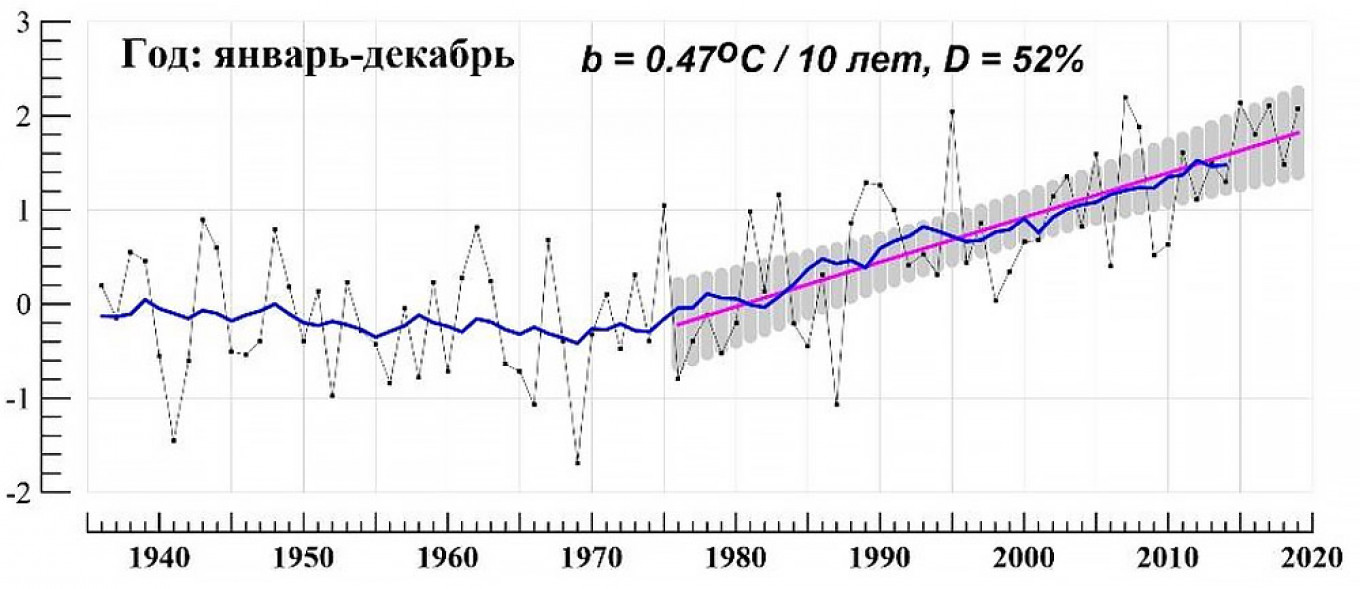
Meanwhile, there has also been a near doubling in the number of extreme weather events in the country over the past two decades.
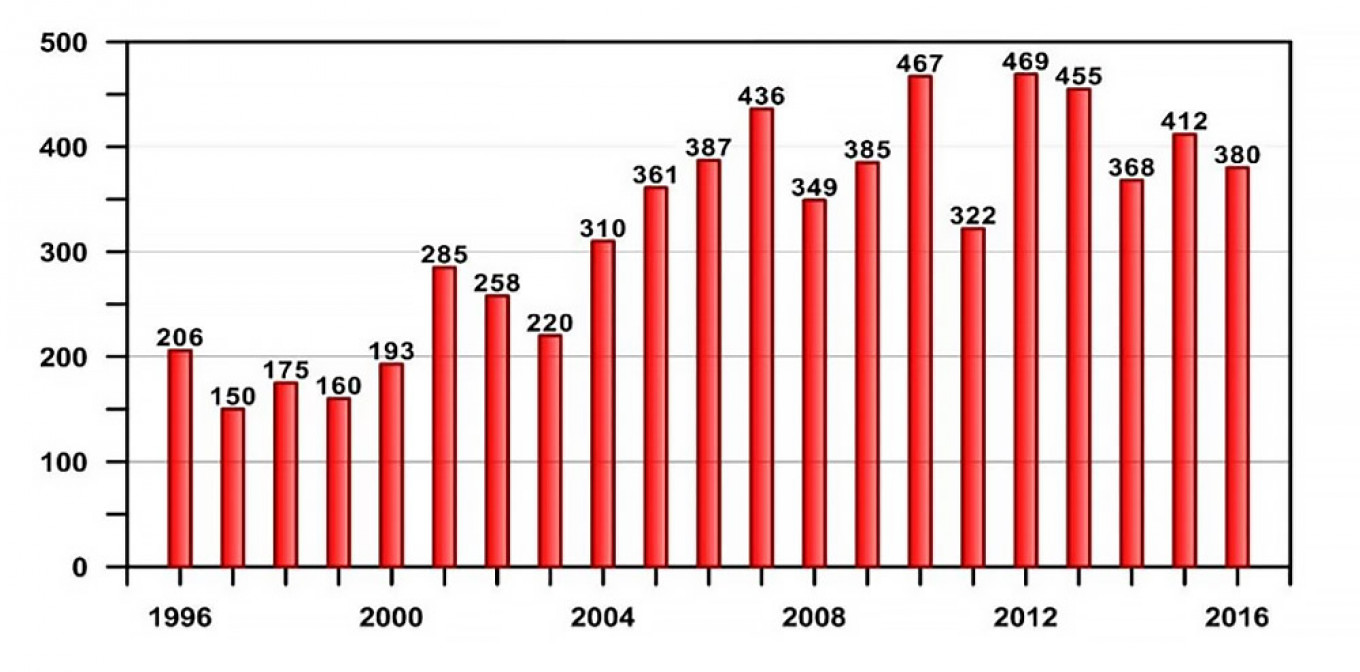
Kattsov chooses his words carefully when assessing past and expected climate change, hedging and grounding many statements in terms of probability and degrees of confidence.
“Science can’t say that a particular weather event, like the heat wave of 2010 or the abnormally warm winter of 2019, is a concrete manifestation of global warming or climate change,” he explained.
“Climate change can only be seen in changes in weather statistics — when the number of extreme and dangerous weather events changes significantly in any particular direction.”
Despite this, he says the data paints a clear picture: Russia’s climate is changing and there is a very high probability that the frequency and intensity of extreme weather events will continue to be exacerbated as a result.
What’s in store?
Because of Russia’s immense size and geographical diversity, the effects of climate change will be multifaceted, with each region being vulnerable in its own way.
However, one factor that is very likely to affect all Russian regions is an increase in average annual temperature, especially in the winter months and in northern regions.
To help illustrate the possible future dangers to policy makers across Russia’s regions, the Climate Center of Roshydromet has published models illustrating how parameters including temperature are likely to change over the coming century, depending on the world’s greenhouse gas emissions.
In a high emission “worst-case scenario” model, every single Russian region is expected to be affected by huge temperature increases, with some experiencing average winter temperature increases of as high as 11 degrees Celsius by the end of the century. In a more favorable scenario, temperatures are expected to rise anywhere up to 4.7 degrees Celsius.
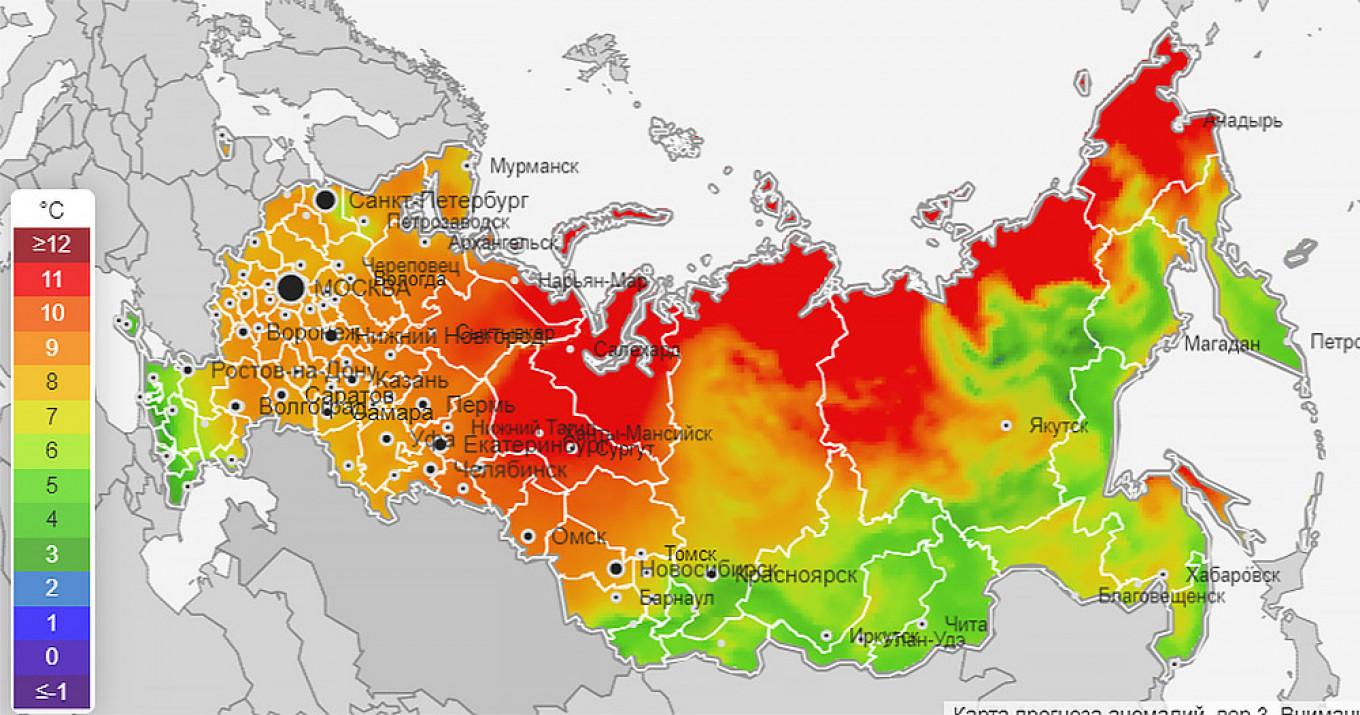
Of all the potential severe weather events in the models, an increase in the number, length and intensity of heat waves across Russia over this century is most strongly supported by the data, Kattsov said.
Floods, meanwhile, are most likely to affect Siberia and the Far East, exacerbated by increased precipitation including downpours in some regions and increased amounts of snow that will melt in shorter periods of time, producing spring floods, in other regions.
Kattsov added that a combination of dry spells and temperature increases can also be expected, with accompanying forest fires and droughts.
“Sometimes people miss the fact that very different phenomena — like floods in one part of the country and heat waves or forest fires in another — can be consequences of a common cause,” he said.
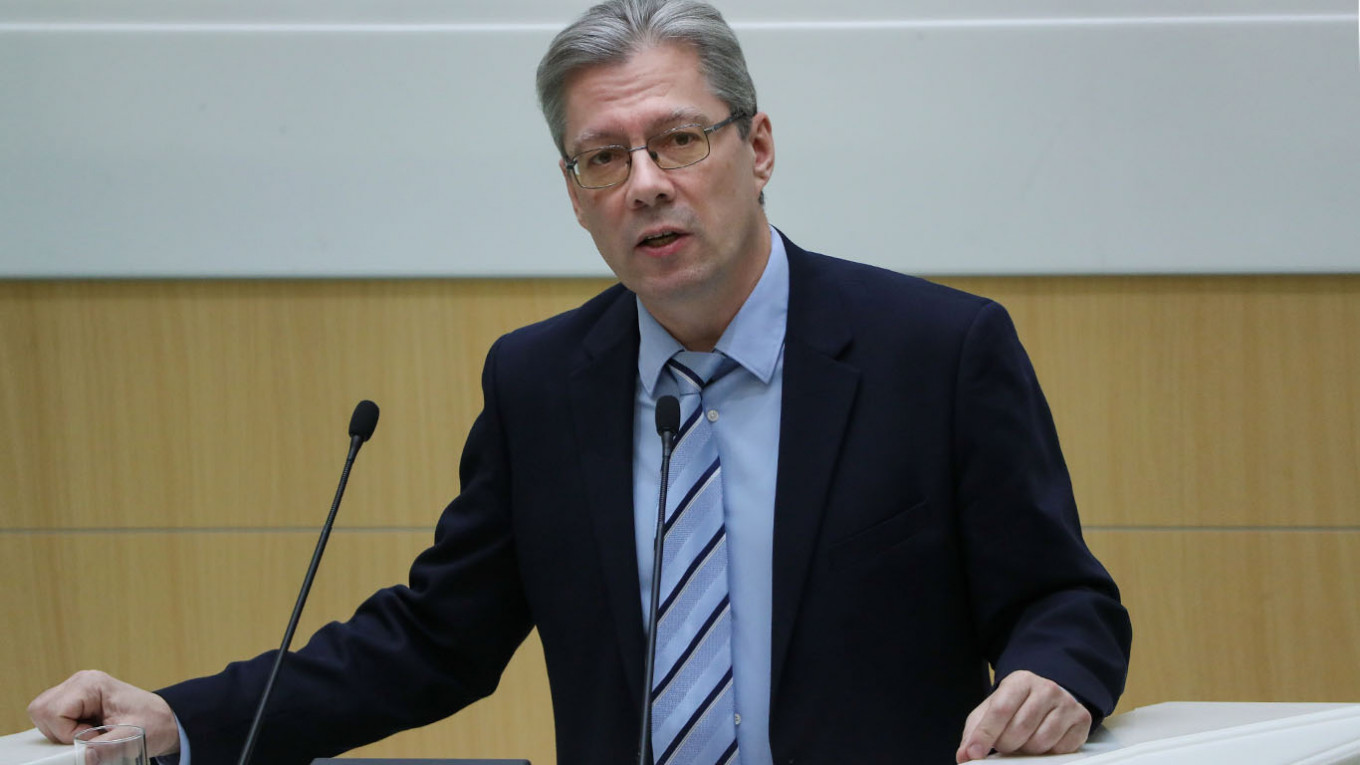
Another ticking time-bomb is the melting permafrost, which covers nearly two thirds of Russia’s territory. As the permafrost melts, infrastructure like roads, pipes, heating systems and houses is likely to be ravaged. Meanwhile, large concentrations of methane and carbon trapped in the permafrost are expected to be released, further exacerbating global warming. The speed and consequences of these releases are the key questions for climate science today.
Russia is also expected to face new risks that are hard to predict, including possible storm surges in the Arctic Sea as well as new parasites and diseases as temperatures increase.
Despite the negative impacts, Kattsov said the warming climate might give Russia some new opportunities, including increased maritime trade along the Northern Sea Route, more accessibility to the Arctic shelf and its resources and more favorable conditions for agriculture.
“These opportunities aren’t clear-cut and they’re not a reason to passively applaud climate change,” Kattsov says, “but it makes sense to undertake efforts to use them as much as we can.”
Russia’s national plan to adapt to climate change, published earlier this year — which the Voeikov Observatory contributed to — is the latest government document that mentions these opportunities.
What’s next?
Striking a balance between mitigating the effects of climate change and adaptation has been a key component of Russia’s approach since the country’s first climate strategy was published in 2009.
“Humanity has realized that there are certain inevitable consequences of climate change and that we won’t be able to put a halt to them anytime soon,” Kattsov said.
“That’s why, regardless of whether there is an international agreement or not, adaptation to climate change is an absolute necessity for Russia.”
When asked if he is worried about climate change, Kattsov said he is, but added that a calm and sober approach is needed to assess the country’s capabilities.
“I think we have a very serious basis for concern, this is a real challenge for humanity and the situation is quite worrying,” he said.
“But I also don’t think there’s a reason to panic or take extreme actions,” he says.
“A cool head and sober view of things is much more constructive than any alarmist signals—even if they’re the result of good intentions.”
Looking forward, he said Russia’s move toward adaptation is a step in the right direction, and he is encouraged about the role that climate scientists will play.
“I’m an optimist in the sense that our understanding of the situation is getting better, and we’re on the right path in terms of prognosis and ascertaining the facts,” he said.



